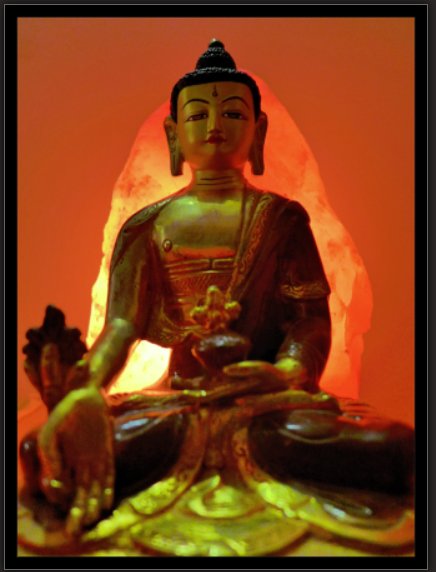| Why Meditation Doesn’t Work by Noemie |
 |
|
December 15, 2014: So often I hear people say “I can’t meditate”. This opinion seems to be increasing in popularity – the idea that some people can meditate whereas others are somehow genetically incapable of meditating. Is it really something innate, or perhaps an obvious consequence of the current age we live in? The days and nights blur together as they spin past at lightning speed, crammed full of ‘important’ multitasking, to-do lists and documenting all of it on social media. Any free time is spent distracting ourselves from ourselves, ensuring that the mind is constantly preoccupied and never available for even a moment to come to terms with itself. Is it true that some of us cannot meditate, or that the design of this pointlessly over-busy lifestyle simply doesn’t allow space for it? From talking to A LOT of people over the years, it seems to me the problem isn’t that fate has conspired against certain people rendering them unable to focus their minds and contemplate tranquility. The real issue is that our high speed lifestyles are designed to deliver near-instant results and we have become over-accustomed to reaching our goals rather quickly, often while simultaneously working towards the fruition of multiple other projects we’re involved in. We are becoming a race of task processors, always with our sights set on achieving an end result. This goal-driven motivation is what makes meditation impossible for people – not the practice itself. So many people approach meditation with such gusto, entering their practice with the expectation of visions, psychic powers and glimpses of enlightenment, only to find their enthusiasm waning later that day after becoming bored and restless. The goal seems unattainable from the outset, and so the obvious conclusion is “I can’t meditate”. The thing is, just like any new skill, meditation takes a lot of PRACTICE. We didn’t take our first steps as a child and figure out how to sprint and hurdle within the same hour – it took years of baby steps to develop more balance and agility. It is no different when training the mind. I remember when I started skateboarding as a little kid. To start with I had no balance and I couldn’t even ride along on flat ground slowly. It took weeks of skating every day before I could ride along without falling off. Fast forward a couple of years later and I was a lot better. I could do kickflips, ollie down flights of stairs and slide down handrails, but I never new these things were possible when I started. I didn’t have my sights set on those goals, I just engaged in the ‘practice’ of skateboarding and new skills naturally developed from there. Practicing anything properly requires us to be focused on the present moment – this is what people mean when they say that “the journey is more important than the destination”. In fact, the journey creates the destination, so starting a meditation practice expecting near-immediate results is approaching things in a completely back-to-front manner. At first meditating can seem like hard work as the waterfall of thoughts and emotions come tumbling by. We never knew the mind was so noisy and unruly until we took a moment to quietly observe ourselves. This process may seem somewhat mundane and repetitive – and it is. Meditation can at times be dull and boring and it can give rise to overwhelming feelings of procrastination. We may also feel that because we have begun meditating, we should no longer fall victim to feelings of anger, jealousy or depression. What a direct shortcut to pure frustration this idea is! These are human emotions that we are always likely to experience to varying degrees. The problem is not the emotions themselves, but our profound lack of mindfulness during these moments of impulsive turbulence. Accepting the inevitability of our habitual tendencies is all part of the practice. We won’t ever master these gremlins of the untrained mind if we don’t keep returning to the practice. It’s like having a baby – you are with your baby every day and although you rejoice in all of the landmark moments – first word, first time standing up, first step etc – it can be difficult to notice how much they change on a daily basis. No matter how monumental the changes of growing up may be, they are pretty much always incremental and only friends and relatives that haven’t seen your child for a while will express genuine surprise when they say “Look how much you’ve grown!”. We know our child has grown, but we didn’t notice it so much on a day-to-day basis. Only looking back can we assess just how far things have changed and evolved, and it is exactly the same when we are working with the mind. It can feel like we are not making any progress with meditation. The improvements can be so incremental that they are literally unnoticeable at first. We feel as though we are getting nowhere with it and that oh-so-popular opinion “I can’t meditate” comes to visit us again. Sometimes we will sit to meditate only to find that we have been sat cross legged for 30 minutes totally absorbed in memories, fantasies or worrying about bills or an argument we had with our spouse. We catch ourselves and realise that we have spent the entire time doing the polar opposite of meditating! If we are one of those goal-obsessed individuals then this would be a clear sign of failure, but this is actually an excellent sign. This is a sign of genuine progress. It will quite likely take many years before we can rest in mindfulness in the face of drama and distraction, but we have taken a step towards it by reflecting on how mentally preoccupied we are when we are meditating. This is all an important part of the practice.
So despite the feelings of boredom and defeat, remaining consistent and identifying with the process of the practice rather than being solely focused on the outcome is all important. This requires a degree of patience and discipline, both of which are key in opening the mind to its natural, wakeful state. Only by loosening our expectations of meditation can we make progress – by relaxing into the practice we create openness and spaciousness. This space holds new possibilities and new potential. It’s actually quite a funny paradox because only by letting go of our vision of the ‘goal’ and simply remaining with the practice itself are we able to develop our capacity for mindfulness. The same can be said for anything really – healing is a great example because often people are trying all sorts of things to heal themselves and nothing seems to work, but as soon as they shift their focus from the accomplishment of healing to merely relaxing in their current ‘unhealed’ state, they become less stressed and less tense, and they become more open – open to new possibilities. By opening up in this way it becomes possible to loosen our grip on the problem, to release whatever it is we are struggling with. Often the process of letting go and opening up is the very thing that heals us, or the catalyst that initiates a cycle of healing that was hitherto impossible… So the repetition of practice wears away at our rigidity and softens the stiff and unworkable nature of our character. Practice sands away the rough edges and gradually creates a more permeable mind. It’s like the incessant tide of the ocean – the waves wearing down the toughness of the mind as if it were a piece of broken glass, being made smooth and ‘safe’ to handle by this repetitive motion. This is the value of repetitive practice, and why we need to recognise the importance of the process rather than being goal obsessed all the time. Next time you tell yourself that you cannot meditate, just remember that meditation will never work for you if you don’t do it. “Just because you didn’t succeed, doesn’t mean you didn’t practice…” – Dzogchen Ponlop Rinpoche. |

 Looking back on my life as a skateboarder, I went through so many periods of feeling like I wasn’t progressing. I would suffer terrible injuries that would take many months to recover from. Some aspects of skateboarding just felt too difficult or terrifying for me, but I always returned to the practice. Many years passed and all of these seemingly ‘negative’ experiences all contributed to my skill and knowledge of that particular activity. There were no shortcuts to getting better at skateboarding. It wasn’t possible to escape all of the pain, injury and frustration because they were all absolutely necessary aspects of evolving my ability and sense of creativity. Likewise, meditation isn’t something that we do to escape from the world or from ourselves, it is a method through which we directly witness the untamed rawness of ourselves and gradually learn – bit by bit – to become the master of our own minds rather than the perpetual slave of our emotions.
Looking back on my life as a skateboarder, I went through so many periods of feeling like I wasn’t progressing. I would suffer terrible injuries that would take many months to recover from. Some aspects of skateboarding just felt too difficult or terrifying for me, but I always returned to the practice. Many years passed and all of these seemingly ‘negative’ experiences all contributed to my skill and knowledge of that particular activity. There were no shortcuts to getting better at skateboarding. It wasn’t possible to escape all of the pain, injury and frustration because they were all absolutely necessary aspects of evolving my ability and sense of creativity. Likewise, meditation isn’t something that we do to escape from the world or from ourselves, it is a method through which we directly witness the untamed rawness of ourselves and gradually learn – bit by bit – to become the master of our own minds rather than the perpetual slave of our emotions.